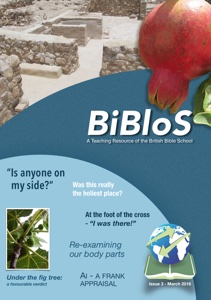Why can we find it so difficult to stop doing things we really do not want to be doing? Whether it is something like cutting down on the calories, stopping smoking or leaving a web site, why do some activities become so compulsive that we begin to feel as if we are being controlled by them?
Of course, the answers to these questions will be varied and sometimes very complex. There are all different kinds of dependencies with all manner of triggers that might set them off, but most likely these behavioural patterns have something of a common theme.
English translations of the New Testament Scriptures generally use the word “sin” to translate the Greek hamartia, which initially conveyed the idea of ‘missing the mark’ and so came to speak of ‘failing in one’s purpose’ or simply ‘doing wrong.’ Though it may no longer be a popular word, sin itself has never been so popular. After all, sin is enjoyable! At least it can be enjoyable – even if only for an instant. If there was no enjoyment in sin then the world would likely not be full of it and none would be lost in it.
Jesus once taught that “everyone who practices sin is a slave to sin” (John 8:34). He was speaking to the religious people who seemed unable to recognise the truth of God, even though they were being directly confronted by it. And it was this inability to recognise truth that had enslaved them, for Jesus had just said to those who believed in him, “If you obey my teaching, you are really my disciples; you will know the truth, and the truth will set you free.” (John 8:31-32 GNB)
It seems that the addictive power of sin lies largely in its deception. The New Testament writer James teaches that “each person is tempted when he is lured and enticed by his own desire” (James 1:14). The picture is perhaps of a fish being lured and enticed by a wriggling worm – but a worm that conceals a deadly hook.
I am not sure that I would be so easily lured and enticed by a wriggling worm, but then I am not a fish and that would not be my “own desire.” However, I am sure that were the fish to know the truth of the matter – that this would be its last supper – that it would not be so eager to take a bite. Wriggling worms really can be so terribly deceptive.
Several months ago I found myself at a location associated with what had been a rather frightening childhood experience. It was the spot where the evil Child Catcher lured and enticed the children with “lollipops .. cherry pie, cream puffs, ice cream and treacle tart .. all free today.” If you have not seen the film Chitty Chitty Bang Bang then you really ought to, even if only for this scene. The following probably ought to be prefaced with a ‘spoiler alert’ but if the children had known the real nature of the horse-drawn wagon, then they are unlikely to have been so enamoured with its supposed contents.
The thing is that as long as we think that sin might yet have something to offer, we will continue to be lured and enticed by its deception. We must open our eyes and see it for what it really is. The truth really will set us free.
Patrick Boyns
This article is from BiBloS, a teaching resource of the British Bible School. To read more articles or download the whole of Issue 3, click here.


